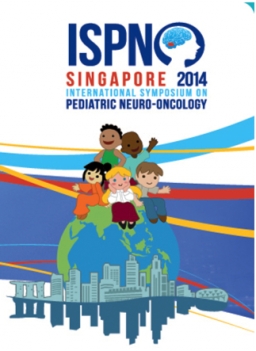
The Childhood Brain Tumor Foundation proudly was a Silver Sponsor of the 16th International Symposium on Pediatric Neuro-Oncology, a biennial meeting.
The meeting was held June 28 through July 2, 2014.
The ISPNO Conference in Singapore was attended by over 900 clinicians and clinical and basic science researchers in neuro-oncology. By design, the conference’s plenary sessions, as well as facilitated poster sessions, featured highly integrated clinical and basic science research. Focused discussions, led by experts from all across the world, were used to put the new discoveries into context. The novel biologic insights into medulloblastoma are maturing and are being rapidly incorporated into treatment schema, although as of yet, the use of these biologic understandings have not been translated into improved out-comes. For recalcitrant tumors, including high-grade gliomas, diffuse pontine gliomas, and atypical teratoid/rhabdoid tumors, new molecular data was presented at the conference; data which radically changes our understanding of these lesions and has disclosed potentially druggable molecular targets. The molecular understanding of pediatric low-grade tumors has already led to different therapeutic approaches.
The conference featured two “great” debates. The first was moderated by Roger Packer from Children’s National, with discussants Eric Bouffet from Hospital for Sick Children in Toronto and Thomas Merchant from St. Jude’s, and debated whether it is correct, medically or ethically, to offer therapies which avoid radiation therapy but carried with them the risk of inferior overall outcome in young children with medulloblastoma and other malignant tumors. The audience was divided in voting on the issue, but overall, favored the option of allowing families to choose, even if it meant that the overall likelihood of survival was less, given the potential neurotoxicity and poor outcome after the use of extensive radiation therapy. The second “great” debate, moderated by Richard Gilbertson from St. Jude’s, with discussants Nicholas Foreman from Denver Children’s and Jae Cho from Stanford, discussed whether pre-radiation or, for that matter pre-surgical chemotherapy, was a viable option, especially since the same drugs could be assessed following radiation or other proven effective therapies. The audience was very split in their vote on this topic.
The meeting was held in conjunction with other international communities and included strong collaborative, multidisci-plinary sessions. The symposium provides an important opportunity for the research community to share advancements in molecular diagnostics and investigative trials that may show promise for patients.
Overall, ISPNO was extremely successful and highlighted how much the field has changed over only a five to ten year period, especially the rapid increase in the molecular understandings of childhood brain tumors. The huge challenge ahead is how to incorporate this information, so as to make meaningful changes in therapy which will result in improved outcomes.
Special thanks to Dr. Roger J. Packer for providing this summary.
